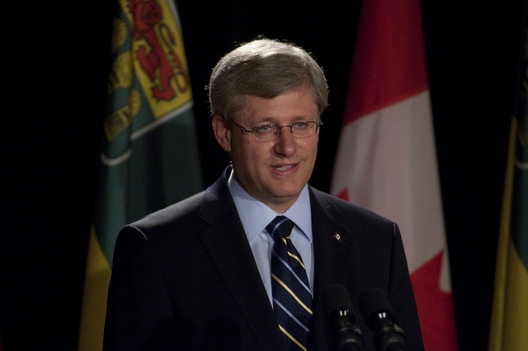 Despite his tough talk about supporting the troops, Stephen Harper has reduced defence spending to just 1% of GDP — the lowest level in Canadian history.
Despite his tough talk about supporting the troops, Stephen Harper has reduced defence spending to just 1% of GDP — the lowest level in Canadian history.
For decades, Canada’s level of defence spending was comparable to that of Denmark, Germany, the Netherlands and Norway (all currently at 1.4%). After the Cold War ended, Jean Chrétien and Paul Martin reduced defence spending to 1.2% of GDP — leading to what General Rick Hillier called a “decade of darkness.” The Afghanistan mission necessitated an increase, with spending returning to 1.4% by 2009.
But then Harper cut deep: At 1% of GDP, Canada’s new defence spending peers are Belgium, Latvia and Slovakia.
Two factors account for the decrease.
First, Harper is focused on delivering a surplus in 2015 that will enable him to cut taxes before the election. Deep spending reductions are therefore needed and, with no significant missions underway or anticipated, the military is an easy target.
Last year, reduced maintenance budgets forced the Army to park many of its trucks, while the Navy tied up half of its patrol vessels. The Air Force cut back on maintenance of its CF-18 fighter jets, with possible safety consequences for its pilots. This year, the PM clawed back an additional $3.1-billion in defence spending.
Second, the Harper government has failed to complete a number of major defence procurement projects and, by so doing, kept them off the budget. . . .
In 2011, the government announced that the Navy’s 44 year-old destroyers would be replaced. No contract has been signed, delivery has slipped to at least 2020, and another $5.2-billion has been deferred. Then, in 2013, the government cancelled a $2-billion purchase of Close Combat Vehicles for the Army.
Finally, there is the never-ending effort to replace the Sea King helicopters. The Martin government signed a contract in 2004, with deliveries promised for 2009. Under Harper, the delivery date has slipped to 2018, with nearly $1.8-billion still to be paid.
Michael Byers holds the Canada Research Chair in Global Politics and International Law at the University of British Columbia.
Image: Canadian Prime Minister Stephen Harper, Sept. 9, 2010 (photo: University of Saskatchewan)
